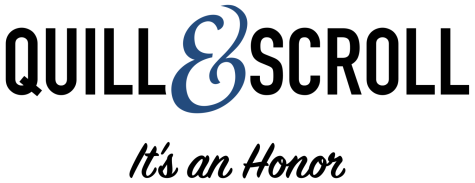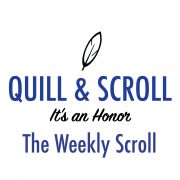The Weekly Scroll for March 30, 2018
News, tips and advice from the Quill and Scroll International Honor Society
Compiled and written by Quill and Scroll journalists
The Lede:
Parkland students take over Guardian
Students from Marjory Stoneman Douglas High School’s Eagle Eye took over news operations for the Guardian US this week covering the March for our Lives protests on March 24. Their stories, commentaries and multimedia are a rich reminder that high school students produce journalism just as valuable — and often more important — than their professional peers. Would your local newspaper be willing to turn over coverage of a local issue to you? Think about it, come up with a good idea, and pitch it.
SPLC aggregates coverage
We’ll leave it to the Student Press Law Center to do this week’s aggregation of coverage of the March for Our Lives.
Letter from a furious teacher
Public school teacher Rebecca Berlinfield issued this call-to-action to legislators on Feb. 17, demanding gun reform so that she no longer is forced to work in an environment where she must live with the constant threat of taking bullets for her students and leaving her own children motherless.
Naomi’s story
So you probably saw the speech delivered by 11-year-old Naomi Wadler at Saturday’s march, but you may not know the entire story behind who she is and how she found herself front and center, sharing a stage with powerful activists such as Emma Gonzalez, David Hogg and Cameron Kasky. The Washington Post wants you to know about her.
Parkland’s other perspective
So there’s another side to the Parkland response to the shooting, and student Kyle Kashuv has become the face of that perspective. He’s become a regular on Fox News, and he also appeared on CBS’s “Face the Nation” to talk about his views, which, in part, include a program in which armed police and unemployed veterans are trained as a police force at schools. “Because we’ve seen in Maryland that the only way to stop a bad guy with a gun is a good guy with a gun,” Kashuv said.
It’s an Honor:
Missouri schools build site for Paralympic team
Students from the Quill and Scroll chapters at five Missouri high schools worked together this winter to produce a website for the U.S. Women’s Sledge Hockey Team, a group of Paralympians who don’t have the monetary support that the U.S. Olympics teams have. So the students and advisers at Richland R-1, Kirkwood, Clayton, Francis Howell North and Francis Howell Central came together with the athletes for a long weekend, shot video, did interviews and produced a website for the team. Here’s the website, and here’s the Quill and Scroll story about the endeavor.
Student Advisory Board sets meeting
The Quill and Scroll Student Advisory Board is in place and getting ready for an in-person meeting at the JEA/NSPA convention April 13 in San Francisco. Here’s the web page where you can meet at least a few of the SAB members, who will be planning a national Quill and Scroll activity for fall 2018.
Writing Contest
Stay tuned. We’re now less than a week away from releasing the full results of the 2018 Writing, Photo and Multimedia Contest results. Keep clicking back to this page to find the winners. ETA is Wednesday, April 4.
News Media Evaluation
We’re now just two days away from having the new forms available for the News Media Evaluation service. Quill and Scroll has re-evaluated its News Media Evaluation over the past two years, and with the help of its Board of Directors and members of the Journalism Education Association, has re-vamped its evaluation forms. Keep watching this page for updates. Forms will be available Sunday, April 1.
Adviser scholarship applications open.
Advisers in active Quill and Scroll chapters have until April 15 to apply for the Lester G. Benz Memorial Scholarship for College Journalism Study. All high school journalism teachers, and newspaper and yearbook advisers who have had at least six semester hours of journalism courses; a minimum of four years teaching experience and advising school publications; currently teaching a journalistic writing class; and a definite commitment to return to the high school classroom and publication advising next year to apply the information gained in the coursework taken as a result of this scholarship. The scholarship program’s objective is to identify and reward experienced journalism teachers and publication advisers (as defined above) who seek the opportunity to upgrade their journalism skills, teaching methodologies and advising techniques.
What’s Viral?:
Return to readers
In an age where news access is constant and delivered in rapid, brief doses, Dan Kennedy explores how consumer attention spans have shifted and suggests how to avoid media addiction. While some experts call for a return to print media focus, others pose a challenge to online news sources: “They’re going to have to be a counterweight to the Net. They’re going to have to find creative ways to encourage and reward readers for slowing down and engaging in deep, undistracted modes of reading and thinking.”
Does Facebook really care about journalism?
Facebook make a lot of money. Period. Facebook makes a lot of that “a lot of money” by allowing its users to share journalistic content among its users. That sounds like a good thing for those of us who produce content, right? Click on my story, I make money. But it’s not that easy. The journalists producing the content make pennies on the dollar that Facebook makes, and often journalists themselves make nothing even though their stories may go viral. One editor claims Facebook really doesn’t care about journalism.
Just a Thought:
Justice for sterilization survivors
Survivors of 1900s practices in eugenics that forced sterilization on thousands of Californian citizens are calling for redress and compensation for the irreparable injustices of the state. A recent study confirmed suspicions that the populations most affected by California’s forced sterilizations were Latina women and Latino men. Read more here about Reproductive Movement and it’s efforts to seek justice for minority women populations here.
Free-range parenting?
That’s what they’re calling it in Utah. It’s what the old folks used to call parenting. You know, when you let your kids do whatever the heck they wanted to do, within reason. And Utah has found it necessary to actually say that this kind of interaction just might be OK.
Like, “Hey, Mom. I’m going to the park to play with Ashley.”
Mom: “OK, honey. Be safe.” NOT “Please wait until I am ready to drive you the two blocks to the park, where my friends and I can sit nearby to make sure that nothing happens to you while you have ‘fun.'”


Leave a Reply
Want to join the discussion?Feel free to contribute!